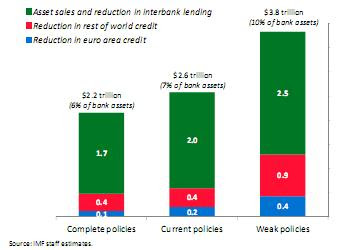First, I would like to give
some introduction for the IMF’s Global Financial Stability Report (GFS). The
IMF releases GFS report twice in a year. The GFS report provides an assessment
of the global financial system and markets, and addresses emerging market
financing in a global context. It focuses on current market conditions,
highlighting systemic issues that could pose a risk to financial stability and
sustained market access by emerging market borrowers. The Report draws out the
financial ramifications of economic imbalances highlighted by the IMF's World
Economic Outlook. It contains, as special features, analytical chapters or
essays on structural or systemic issues relevant to international financial
stability. (Source: IMF website)
On Thursday (18.04.2012), the International Monetary Fund has warned that an escalation of the Euro zone debt crisis could force European banks to sell assets worth up to $3.8 trillion by the end of 2013. It said that this would trigger to a fresh credit crunch. In its spring Global Financial Stability Report, IMF said that should markets lose faith in the effectiveness of Euro zone policies, rising funding costs and increased stresses within the banking system could force banks to rapidly reduce their balance sheets to raise capital buffers. IMF in its GFS report stated that “Under the current Policies scenario the negative impact on euro area credit supply from EU bank deleveraging is estimated at around 1.7 percent of credit outstanding. But under the weak policies scenario, the decline of euro area credit could be as high as 4.4 percent over the two years, causing euro area real GDP to be 1.4 percent lower than the baseline at the end of 2013. The impact of deleveraging is global, although it will likely to be strongest in the periphery of the euro area and in emerging Europe” (see table & graph below).
On Thursday (18.04.2012), the International Monetary Fund has warned that an escalation of the Euro zone debt crisis could force European banks to sell assets worth up to $3.8 trillion by the end of 2013. It said that this would trigger to a fresh credit crunch. In its spring Global Financial Stability Report, IMF said that should markets lose faith in the effectiveness of Euro zone policies, rising funding costs and increased stresses within the banking system could force banks to rapidly reduce their balance sheets to raise capital buffers. IMF in its GFS report stated that “Under the current Policies scenario the negative impact on euro area credit supply from EU bank deleveraging is estimated at around 1.7 percent of credit outstanding. But under the weak policies scenario, the decline of euro area credit could be as high as 4.4 percent over the two years, causing euro area real GDP to be 1.4 percent lower than the baseline at the end of 2013. The impact of deleveraging is global, although it will likely to be strongest in the periphery of the euro area and in emerging Europe” (see table & graph below).
Impact of European
Bank Deleveraging under Three Policy Scenarios, Through End-2013
Contributions
to Aggregate Reduction in Bank Assets
(In trillions of U.S. dollars)
(In trillions of U.S. dollars)
On Thursday, it went on to say that “The impact
of bank deleveraging is global, although it will likely be strongest in the
periphery of the euro area and in emerging Europe” It also said that “Among
emerging markets, emerging Europe is most vulnerable, given the region’s large
economic exposure and strong banking links to the euro area, as well as large
gross external financing needs and more limited policy buffers” It also stated that
“A key challenge will be to control spillovers from the euro area into emerging
Europe and elsewhere” and went on to say that “Both Japan and United States need to put in place
credible multi-year plans for deficit reduction, which protect short-term
growth but reassure financial markets that debt will return to a sustainable trajectory
over the medium term.”
Major Points of the Report:
The
report talks about risk stemming from private sector deleveraging and the
resilience of emerging markets. It also gives you the implications of recent reforms
in the financial system. The IMF’s GFS report had warned the Euro economy that an
escalation of the Euro zone debt crisis could force European banks to sell
assets worth up to $3.8 trillion by the end of 2013. The interesting part of
the report is it said that there are potentially very large financial implications of
longevity risk—that is, the risk that people may live longer than expected. The
report said that magnitude—amounting to between 25 percent and
50 percent of 2010 GDP, on average—and provides estimates of its effects
on fiscal balance sheets and businesses. It stated that Japan and U.S. should put
in place credible multi-year plans for deficit reduction in order to protect
short term growth and that debt will return to sustainable trajectory over the
medium term. It also stated that the global financial regulatory framework is
being strengthened, but key agreements still need to be concluded, while the transition
to this new setting could add to cyclical challenges facing financial
institutions.

